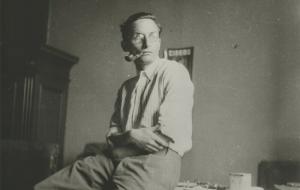Stephen Jay Gould: biography of this paleontologist and evolutionary biologist
Stephen Jay Gould (1941-2002) was an American geologist, paleontologist, and historian of science, who has been very influential in the theory of evolution, as well as in the dissemination of scientific knowledge in different areas.
He is recognized to this day as one of the science legends of the 20th century. Next we will take a brief tour of the life and work of this scientist through a short biography of stephen jay gould.
- Related article: "The theory of biological evolution"
Stephen Jay Gould: biography of this influential scientist
Stephen Jay Gould was born on September 10, 1941 in the borough of Queens in New York City. He was the son of a World War II veteran stenographer, and an artist daughter of Jewish immigrants who lived and worked in Manhattan, New York.
Both Stephen Jay Gould and his younger brother grew up in Northeast Queens, a middle-class neighborhood where Jay had the opportunity to attend college. At the age of 19 he studied at Antioch College, where he participated in various student movements for civil rights and social justice
, especially against segregationist policies based on racialization.In fact, much of his later work was focused on denouncing different forms of oppression due to differences. cultural, and roundly criticized the scientific racism that permeated the production of research in those moments. For Gould, scientific theories that had racist biases were nothing more than pseudoscience used in the service of racism.
However, Stephen Jay Gould is best known for his work in paleontology, whose interest he began from very young, after visiting the dinosaur exhibit at the American Museum of Natural History in New York.
During his stay at Antioch College, Stephen Jay he specialized as a geologist and philosopher, and later took some courses at the University of Leed in England. He continued training at Columbia University under the guidance of geologist and paleontologist Norman Newell, and eventually he was hired by Harvard University, where he served as a professor and curator at the museum of zoology comparative.
Gould has been a very important researcher for evolutionary theory, becoming one of the three most cited authors in the journal Palaeobiology (it is found only after Darwin and Simpson). But not only that, but he is recognized as an important historian of science and as one of the best popularizers of science. Especially after having worked for Natural History magazine for a long time.
Stephen Jay Gould died in New York City on May 20, 2002 from lung cancer that had spread to other parts of the body.
- You may be interested in: "The 10 branches of Biology: its objectives and characteristics"
main theories
As we have seen, Stephen Jay Gould he served not only as a paleontologist but as a biologist and historian of science. He is recognized for having developed theories on evolutionary biology that were in a strong opposition to the nascent sociobiology, since he considered it a deterministic vision of society. On the other hand, his theories were also in opposition to evolutionary psychology, considering it a deterministic perspective of individual human action.
However, he also recognized several of the contributions of both branches, and at the same time he stayed away from Darwinian determinism. He also defended the hierarchical theory of evolution as a way of extending Darwin's classical theories. In line with the above, Gould positioned himself firmly against the thesis of the creationism and against collaboration between science and religion.
punctuated equilibrium theory
Perhaps Stephen Jay Gould's most recognized theory is the Punctuated Equilibrium Theory, developed together with another American paleontologist named Niles Eldredge. In this theory, based on fossil records, he proposes that evolution has occurred at a certain rate.
Said rhythm has the main characteristic of having occurred in a ramified way, that is to say that, from a first species, many others gradually arose. Genetic changes in this process have occurred during periods of stability with minor modifications, interspersed with changes that occur relatively quickly.
Unlike previous theories that proposed that a disappeared species was followed by another more evolved one, and so on; punctuated equilibrium suggests that the same ancient species could give rise to many different species in a branching (or punctuated) manner. This theory he represented a very important neo-darwinian revolution to understand evolution.
Awards and distinctions
In 1982, Gould received the Alexander Agassiz Award (Professor of Zoology) from Harvard University. The following year he was granted membership in the American Association for the Advancement of Sciences and six years later, he was appointed president of the same.
He also served as president of the paleontological society and the society for evolutionary studies. Finally he was appointed in 1989 member of the National Academy of Sciences, and in 2001, the year before his death, he was named Humanist of the Year by the American Humanist Association.
Outstanding works
The most recognized popularization texts of him are The fake measure of man from 1980, the wonderful life, from 1999 and From Darwin, from 1977, which was his first published book. Likewise, his last book published by him has been very influential, where he summarized the theory of modern evolution according to his own research. It's about the book The structure of the theory of evolution, from the year 2002.
Other of his works, where he addressed the differences between science and religion, are once upon a time the hedgehog and the fox, from 2003, and Science versus religion, a false conflict, from 1999.

